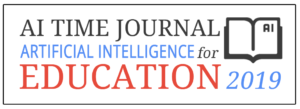
Zafer Demirkol is the author of 10 books on programming. His latest book is “Coding for Kids”. In recent years he has been working on artificial intelligence. He develops artificial intelligence content and programmatic tools, especially for children and beginners. He also provides coding and artificial intelligence training for children. He is a member of the European AI Alliance.
In this interview, Mr. Demirkol shares insights on how AI will contribute to creating an accurate educational model that can adapt to the needs of each student while improving the teachers’ lives as they will be able to focus on developing human-like skills such as creativity.
This interview has been
featured in the AI for Education Initiative 2019.

What are the major challenges in the educational system today? How can AI technology help solve or mitigate them?
I think that the traditional education system is out of time. Technology is progressing very fast and educational institutions cannot keep up with it.
Artificial intelligence can give students and teachers a number of tools to solve this problem.
The main challenge in the future will be that there is too much information and that the student loses his way between this complexity. Artificial intelligence can guide us in creating an accurate education model and it can develop personalized models and provide tools for this.
AI can apply the principles of simplification, enrichment, and reinforcement, which are the main components of education, more effectively.
What are the major opportunities brought by AI in Education today?
Less costly, more competent and effective education.
Teachers or mentors, they will be more observers but technically more equipped than ever. They must acquire the skills to use AI-supported tools effectively.
How can teachers prepare for an AI-powered education?
Teachers will take on the role of mentors more. They can improve themselves on issues such as human creativity that machines cannot do. Teachers or mentors, they will be more observers but technically more equipped than ever. They must acquire the skills to use AI-supported tools effectively.
Which AI technology do you think will have the biggest impact in Education in the coming years, and why?
Absolutely deep learning. Deep learning and future versions will form the backbone of education. Deep learning-supported AR and VR technologies, in particular, will create radical changes. It will reduce training costs and provide equal opportunities. In fact, AI is an ecosystem, it should not be considered alone, along with AI it will develop in technologies such as IoT, AR, VR and education will have a completely different appearance. As education develops, advances in these technologies will be faster. In other words, the speed of development in future technologies will be much more accelerated with this change in education.
Do you see threats of inequality in the access to AI-powered education?
There may be some problems in the transition period, but I think they will be solved in the medium and long term. I think that many people will have access to AI-supported education in the not too distant future. As I mentioned before, I anticipate that the education costs will decrease considerably.
If you look at it from another angle, there are still places where electricity and internet do not reach.
From this point of view, I would say that very few will benefit from AI services in the longer term.
The increase in the amount of data, the acceleration of computers and the development of training-specific models will bring about radical changes.
What are the current technological limitations of AI which, once overcome, could bring massive improvements to the educational system?
Artificial intelligence is a technology that is associated with all other technologies.
Advances in AI and other technologies will find reflection in education.
The increase in the amount of data, the acceleration of computers and the development of training-specific models will bring about radical changes. These developments will also affect technologies such as AR and VR and we will have more competent tools for training. In this sense, it would be wrong to mention only the limitations of a subject or technology.
What do you think are the biggest obstacles to applying AI in the educational system?
The other day, my 11-year-old son asked me, “Dad, are you still using the classic calculator on your phone?”
I: “Yes, why is that?”
“You can have your calculation done by talking to your phone”
Our first obstacle is to adapt to next-generation technologies.
Another difficulty is that the speed, especially in mobile networks, is not yet sufficient. Increasing internet speeds and especially the spread of 5G technology will bring radical changes in practice.
Another problem is the transformation of classical methodology into AI methodology. Development of tools for training with AI, their use and steps to replace traditional methods. All these problems need to be overcome.
Where do you see AI for education in the next 5-10 years?
AI will be the backbone of education.
